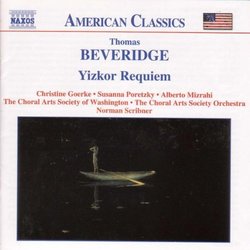Are we all listening to the same recording?
Fred Smithson | Florida | 03/30/2001
(3 out of 5 stars)
"Are the rest of you reviewing the same CD that I listened to? I appreciate the effort made by the composer in this work. But after listening I was disappointed to here a composition that seemed more aimed at fitting a marketable niche than creating a the kind of addition to the recorded repertoire that the other reviewers claim. As for the chorus - I appreciate the other reviewer's enthusiasm (perhaps he/she regularly hears this chorus live in DC?) but based on this recording - its just not in the league of America's more famous symphonic chouruses."
Almost Brilliant
Timothy Dougal | Madison, Wi United States | 01/17/2003
(4 out of 5 stars)
"This is a very impressive musical/ecumenical effort, combining western choral style with Hebraic incantation, utilizing Hebrew, Latin and English texts seemlessly, creating an intercultural web of spiritual associations and insights. The performance, generally, is excellent, as is the live recording (which is less noisy than many studio recordings). Alberto Mizrahi's singing is nothing less than ecstatic. The emotional effect is profoundly moving. So why is it almost brilliant? Beveridge seems to have succumbed to the Spielberg Insecurity Principle, which causes the artist to believe his work does not fully commuincate what it in fact communicates, and that it needs ONE MORE THING (which doesn't really fit) to clear it up. In the case of the present work, the ONE THING is a spoken prayer inserted into the fading sequence of 'Amens' which close the work. It's a good prayer, and if I were at an actual funeral, in a house of worship, presided over by a minister, I would appreciate this prayer. In the context of this massive musical work, however, it is unnecessary, redundant, intrusive, and distracting. It is liturgy, not music or art. It says less than the work as a whole, and detracts from the peace of the approaching silence. It's like having someone read a poem as Mahler's 9th fades out. If I get a CD burner, I will definitely see if I can edit it out!"


 Track Listings (10) - Disc #1
Track Listings (10) - Disc #1